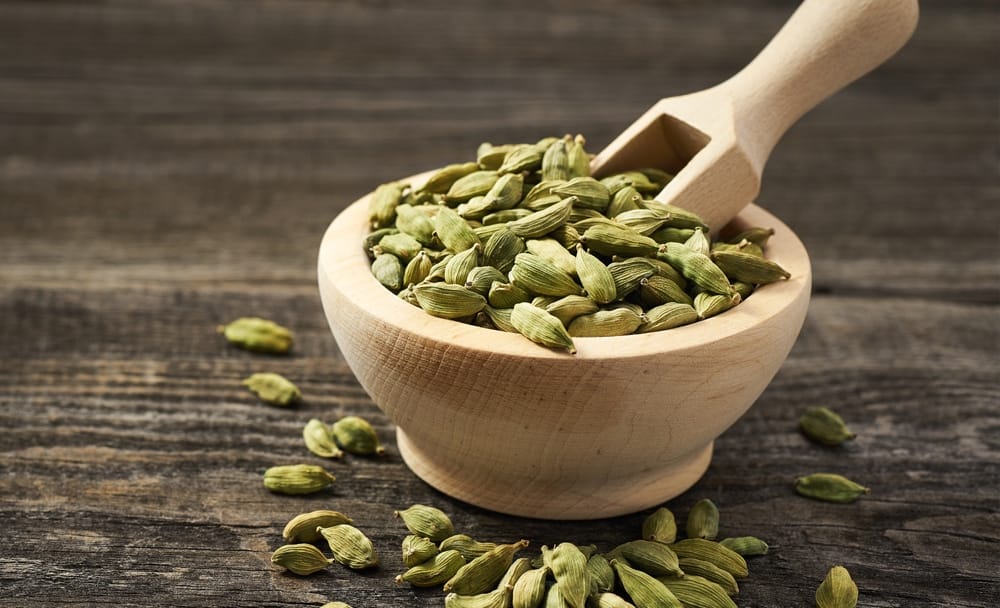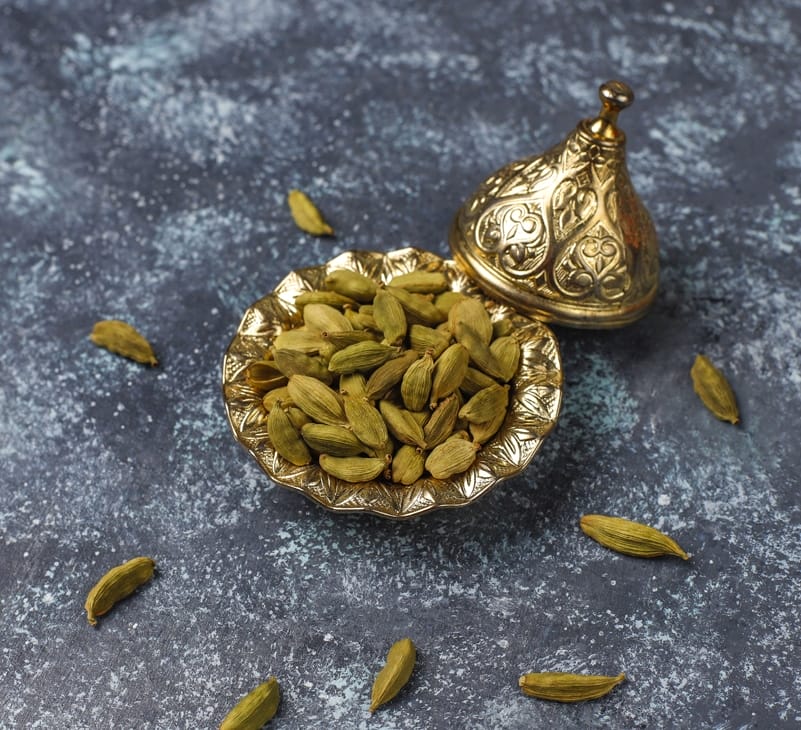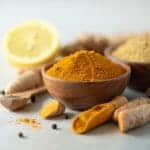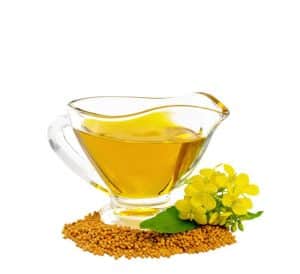
Cardamom, also known as the queen of spices, is a popular culinary and medicinal herb. In India, it is known as Elaichi and is widely used as a mouth freshener and flavouring agent. There are many health advantages of cardamom. The other advantages of cardamom spice are that it is a storehouse of antioxidant, anti-inflammatory and antibacterial properties and helps treat several diseases and disorders.
Chemical Components of Cardamom [1]
| Component | Percentage |
| 1,8-cineole | 25. 6% |
| Linalool | 6.3% |
| α terpinyl acetate | 40.7% |
| α-Pinene | 1.4% |
| β-Pinene | 0.3% |
| Linalyl acetate | 2.0% |
Cardamom Medicinal Properties [1]
In the Indian Ayurvedic system, cardamom has been used to treat skin and urinary issues as well as to decrease body fat accumulation. Other beneficial properties of the seeds of cardamom are as follows:
- Carminative properties (Relieves flatulence)
- Digestive properties
- Anti-emetic (Stops vomiting)
- Benefits heart-health
- Anti-asthmatic
- Anti-bronchitis
- Anti-halitosis (Decreases bad breath)
Types of Cardamom
Ayurveda mentions two types of cardamom, namely Sukshma or Choti Elaichi and Brihat or Badi Elaichi. Brihat Ela has black coloured cardamom pods, whereas Sukshma Ela has green coloured pods.
Cardamom: From the Lenses of Ayurveda
According to Ayurveda, cardamom has Katu (pungent) and Madhura (sweet) taste and exhibits Laghu (light to digest) and Rooksha (dry) qualities. It is considered Tridoshic, meaning it helps to balance all three Doshas. It is particularly beneficial for people with aggravated Vata and Kapha.
Health Benefits of Cardamom Backed by Ayurveda

Treats Cough And Cold
Packed with expectorant, antioxidant, antibacterial and anti-inflammatory properties, cardamom helps to expel the mucus from the respiratory tract and treat cough and cold. Furthermore, it helps to balance Kapha Dosha which is considered the leading cause of mucus accumulation in the lungs.
Supports Digestion
Being an aromatic herb, cardamom helps to enable the secretion of digestive enzymes and support healthy digestion. In addition, it also helps treat several gastrointestinal disorders, such as indigestion, gas, constipation, etc. Gas and flatulence are usually caused due to an aggravated Vata and low Pitta in the body. By balancing both the Doshas, cardamom prevents gas formation and improves digestive fire.
Eliminates Bad Breath
Cardamom is one of the best herbs to improve oral hygiene. It contains cineole, a component known for its antimicrobial properties, thereby helping to fight harmful bacteria in the mouth.
Boosts Heart Health
According to Ayurveda, cardamom helps lower high blood pressure levels and improve blood circulation. Additionally, it also protects cardiac cells, prevents blood clots and reduces the risk of many cardiovascular diseases.
Aids in Diabetes Management
Rich in manganese, cardamom is known to control high blood sugar levels in the body and manage diabetes. Black cardamom is particularly considered beneficial for diabetes patients.
Helps To Lose Weight
By supporting metabolism, cardamom helps burn the excess fat in the body and maintain healthy body weight.
Relieves Sleep Troubles

The aroma of cardamom essential oil is highly effective in alleviating sleep problems. It helps reduce stress, anxiety and restlessness, all of which can cause insomnia or disturbed sleep.
Prevents Cancer
The natural phytochemicals present in cardamom help fight cancer and reduce the risk of the disease.
Supports Liver Health
According to Ayurveda, cardamom exhibits detoxifying properties and helps remove toxins from the liver. It is powered with antioxidant, anti-inflammatory and antiviral properties, thereby helping to manage several liver disorders.
How To Use Cardamom?
You can chew cardamom pods every day after lunch and dinner. It will help improve digestion and also serve as a mouth freshener. However, if you find the flavours of cardamom to be too strong, then you can add its powder to your tea, coffee or milk.
You can also make cardamom tea by steeping some cardamom pods in water for a few minutes. You may add a teaspoon of honey to this tea to make it even more flavorful. There are many benefits of cardamom tea. It helps treat flu, improve digestion and boost metabolism.
Precautions to Take With Cardamom [2]
It’s important to consult your healthcare provider before consuming cardamom if you have allergies or are taking medications such as bupropion, tamoxifen, propofol, or methadone. Laboratory analysis has suggested that α-terpinyl acetate in cardamom may indirectly affect the metabolism of these medications commonly used to treat chronic conditions like cancer and depression.
Side Effects Of Cardamom
Cardamom does not have any side effects and is usually safe for consumption by everyone. Even pregnant women, lactating mothers and children can take cardamom in moderate quantities. However, Ayurveda does not recommend excessive use of cardamom as it might affect fertility.
The Final Takeaway
There are many health benefits of cardamom spice. It helps to treat cough and cold, boost digestion, stimulate metabolism, control blood sugar levels, lower blood pressure levels and alleviate bad breath. It is packed with various nutrients such as vitamin C, calcium, manganese and iron, all of which help improve physical and mental health.
Disclaimer: Results vary depending upon individual body constitution. This is for general information and not meant to substitute any medical advice. Consult your healthcare provider for any health concerns.
FAQs
What are the benefits of eating Cardamom?
Cardamom offers potential benefits such as improved digestion, anti-asthmatic, anti-bronchitis and antioxidant properties. Additionally, it may alleviate insomnia and also aid in combating bad breath. [1]
What are the benefits of cardamom for skin?
Cardamom’s antimicrobial qualities aid in treating breakouts and purifying the skin by removing blemishes. It aids in providing you with a more clearer and balanced complexion. [3]
What are the medicinal uses of Cardamom?
Cardamom is used to treat digestive issues such as loss of appetite, constipation, intestinal gas, irritable bowel syndrome (IBS), heartburn, and intestinal spasms. [1]
Can Cardamom reduce the risk of gastroenteritis?
Cardamom may be useful in lowering the incidence of gastroenteritis. By breaking down the bacterial cell membrane of Campylobacter spp., cardamom suppresses the bacteria that cause gastroenteritis due to its antimicrobial properties. [4] [5]
Is Cardamom a laxative?
Cardamom powder relieves constipation by acting as a laxative. It can be helpful to take cardamom powder or the doctor’s advised amount with a glass of warm water before bed. [6]
Disclaimer: This article is from a health and wellness perspective only and does not constitute medical advice. Kindly seek the help of a trained medical practitioner before initiating any treatment.
References:
- Savan EK, Küçükbay FZ. Essential oil composition of Elettaria cardamomum Maton. Journal of Applied Biological Sciences. 2013;7(3):42-5.
- Cardamom. Potential Health Benefits. Singletary, Keith PhD. DOI: 10.1097/NT.0000000000000507
- Chapter 34 – Cardamom (Elettaria cardamomum Linn. Maton) Seeds in Health. 2011
- Cardamom powder supplementation prevents obesity, improves glucose intolerance, inflammation and oxidative stress in liver of high carbohydrate high fat diet induced obese rats. 2017
- Cardamom, Cumin, and Dill Weed Essential Oils: Chemical Compositions, Antimicrobial Activities, and Mechanisms of Action against Campylobacter spp. 2017
- Elettaria cardamomum. V.A. Parthasarathy, D. Prasath. 2012
























